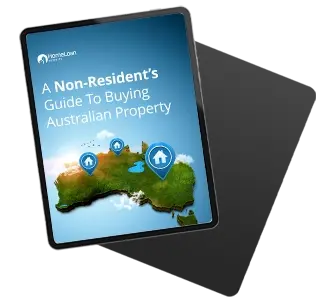Key Points
How much can I borrow?
- Borrow up to 90% of the property value if you’re an Australian earning income in a foreign currency.
- Borrow up to 80% of the property value if you can’t provide normal income verification documents.
- Borrow up to 100% of the property value with a guarantor home loan if you have a guarantor in Australia.
- Borrow up to 90% of the property value if you’re an Australian earning income in a foreign currency.
- Borrow up to 80% of the property value if you can’t provide normal income verification documents.
- Borrow up to 100% of the property value with a guarantor home loan if you have a guarantor in Australia.
Will I get approved?
- Australian citizens earning an acceptable foreign currency income can qualify.
- All other foreign income will be considered on a case-by-case basis. Some lenders are stricter than others.
- Some lenders will use foreign tax rates, rather than Australian tax rates, so you can borrow more.
- If you are living in Australia and earning a foreign income, this is seen favourably compared to living overseas.
- Interest-only loans available (max 5-year term).
- Australian citizens earning an acceptable foreign currency income can qualify.
- All other foreign income will be considered on a case-by-case basis. Some lenders are stricter than others.
- Some lenders will use foreign tax rates, rather than Australian tax rates, so you can borrow more.
- If you are living in Australia and earning a foreign income, this is seen favourably compared to living overseas.
- Interest-only loans available (max 5-year term).
What interest rates are available? Get the same interest rate discounts offered to Australians earning in AUD.
Get the same interest rate discounts offered to Australians earning in AUD.
Lenders available: Select bank and non-bank lenders are available. Contact us now to find out more.
Select bank and non-bank lenders are available. Contact us now to find out more.
Discover if you qualify: We can help you buy property anywhere in Australia.
We can help you buy property anywhere in Australia.
Foreign income mortgage calculator
Discover if the bank will accept your foreign income
How much income will the bank use?
Did you know that some banks will only take into account some of your foreign income?
To allow for exchange rate movements, some lenders will only use 60% to 90% of your foreign income.
This means you may need to be earning some money in Australian dollars (AUD) or show rental income from an Australian property that you own.
Our best lenders will actually use 100% of your foreign income as long as you’re in a strong financial position.
Moreover, Australians earning a foreign income are often highly-skilled professionals that have stable employment and make a good living.
Because of this, you can get the same home loan features and interest rate discounts as if you were earning income in AUD.
What currencies do banks prefer?
- Great British Pound or UK Sterling (GBP)
- Euro (EUR)
- Hong Kong Dollar (HKD)
- New Zealand Dollar (NZD)
- Singapore Dollar (SGD)
- United States Dollar (USD)
- Canadian Dollar (CAD)
- Indian Rupee (INR)
- Indonesian Rupiah (IDR)
- Chinese Yuan Renminbi (CNY)
- Japanese Yen (JPY)
- Danish Kroner (DKK)
- Philippine Peso (PHP)
- Samoan Tala (WST)
- South African Rand (ZAR)
- South Korean Won (KRW)
- Sri Lankan Rupee (LKR)
- Swedish Krona (SEK)
- Swiss Franc (CHF)
- Taiwan New Dollar (TWD)
- Tongan Pa’anga (TOP)
- Ni-Vanuatu Vatu (VUV)
If your currency isn’t a preferred currency then you may need a larger deposit.
Complete our free assessment form to find out how much of your foreign income your bank will use and whether you need a bigger deposit.
Secondary currencies that banks may consider
- Bahrain Dinar (BHD)
- Belgian Franc (BEF)
- Brunei Dollar (BND)
- Deutsche Mark (DEM)
- Dutch Guilders (NLG)
- AED – Emirati Dirham
- Fijian Dollar (FJD)
- French Franc (FRF)
- Indonesia Rupiah (IDR)
- Kuwait Dinar (KWD)
- Macau Pataca (MOP)
- Malaysian Ringgit (MYR)
- Mauritian Rupee (MUR)
- Norwegian Krone (NOK)
- Omani Rial (OMR)
- Papua New Guinean Kina (PGK)
- Qatar Riyal (QAR)
- Saudi Arabian Riyal (SAR)
- Solomon Island Dollar (SBD)
- Thai Baht (THB)
- Vietnam Dong (VND)
Other currencies
Please contact us as we have some lenders that will accept almost any currency if your are an Australian citizen or permanent resident (PR) visa holder.
How do I prove my foreign income?
Generally speaking, your financial documents must be in English or you need a certified interpreter to translate the documents that you provide to the lender.
You’ll typically need to provide a combination of the following documents depending on the lender:
- A letter from your employer
- A copy of your employment contract
- Two payslips
- Three months of bank statements showing your salary being deposited into your account
- Tax returns for the last financial year
Checkout the proving foreign income page for more information.
Buying A Home in Australia As A Non-Resident
Everything you need to know as a non-resident buying a property in Australia.

What about bonus, overtime and allowances?
It’s common for people living overseas to earn a variety of income types including:
- Bonuses
- Overtime
- Allowances
- Commission
- Free rent / subsidised rent
- Subsidised living expenses
The rules around these income types vary depending on the country you are in and the type of income that you earn.
As a general rule, lenders will use 80% or less of this income as it may be less stable than your base income.
To better your chances at approval, lenders like to see a long history for bonuses, overtime and commission as it may vary from year to year.
Typically, a two-year history is required for this income to be used.
How will banks assess my overseas debts?
Some lenders ignore foreign debts when calculating your borrowing power if your rent income covers your loan repayments.
Others will add a buffer of approximately 30% to your repayments to allow for increases in interest rates.
Others assess your foreign debts at a much higher ‘assessment rate’ which greatly reduces your borrowing power.
For example, a mortgage in the USA may be fixed for 30 years at a low rate and so it isn’t reasonable to assess it using more than double the actual repayments that you are making.
Do you earn foreign business income?
Is your business registered in a foreign country?
There are very few lenders that accept this type of income because of the tax implications of converting it back into Australian dollars.
This makes it difficult to prove your actual income with business bank statements.
However, some lenders will consider your application under a low doc lending policy meaning that you may only need to supply an accountant’s letter to verify your foreign business income.
If the business is registered in Australia but the business sells overseas, we have some lenders that will assess these proceeds under standard lending policy.
Are you employed by a foreign company?
People that apply for foreign income home loans are often highly-paid specialists or consultants that work for government agencies, non-government organisations (NGOs) or large multinationals.
For example, fly-in fly-out (FIFO) workers, particularly in the engineering and mining space.
More often than not, tax is not withheld from your pay and your income is paid into your Australian bank account.
We know lenders that will assess this as standard PAYG income even though, in most cases, you won’t receive sick leave, annual leave or other entitlements.
Discover more about what banks typically want to see in a foreign income application by checking out the proving foreign income page.
Do you earn rent from an overseas property?
It’s not uncommon for Australians earning foreign income to own property in the country that they make a living in.
This may be because they have a particularly strong tie with the country, they travel there frequently or they simply want to take advantage of a unique real estate market.
When it comes to assessing your ability to borrow, most lenders ignore this rental income.
However, some lenders will include part of this income, typically up to 85% or less to allow for exchange rate movements.
You can even use it to offset any foreign loans or debts that you currently have in order to put yourself in a better debt-to-income position when being assessed by the lender.
Essentially it means you can borrow more!
Will banks use gross income or net income?
Did you know that Australian tax rates are some of the highest in the world?
Some lenders use Australian tax rates when assessing your income which limits your borrowing power.
Luckily, there are other lenders that will use foreign tax rates which allow you to borrow more.
There are complex rules around this which vary between lenders.
This becomes a bit tricky with countries like Hong Kong where you pay tax in instalments or, in the UAE or Saudi Arabia, where you don’t pay tax at all.
This is because some lenders will only use foreign tax rates when they can see tax withheld from your payslips.
Please contact our non-resident mortgage brokers who are experts in this area and can confirm how your income would be assessed.
What if I'm self-employed?
If you’re self-employed, the lending rules are too complex to accurately write on a web page.
They vary depending on the country you are living in, the currency you are earning, whether you’re an Australian citizen, and if you can provide income evidence such as tax returns.
For example, a lender is more likely to consider your mortgage application if the country in which you are self-employed has easily readable and understandable tax returns.
To give yourself the best chance at approval, try to provide the following:
- Prove your income with 2 years tax returns, 6 months bank statements or an accountant’s letter.
- You may also need to provide a full credit history from your country of origin.
- In some cases, your living expenses can be assessed based on the country you live in.
Please contact us to discuss your specific circumstances.
What about income from other foreign investments?
Apart from property, you may own foreign shares or interests in a company.
Foreign dividends, interest income or other investment income can all be considered as part of your regular income!
Typically, you’ll need to provide your last 2 years Australian and foreign tax returns or bank statements showing salary credits.
The main thing the bank wants to know is that the income is regular and ongoing into the foreseeable future.
Do you earn a foreign pension?
Are you a dual national?
You may be eligible to receive the pension in a foreign country.
The pension age can vary depending on the country and whether you’re a male or a female.
There a few lenders that will consider this income on a case by case basis depending on the currency.
Typically, the pension cannot be your sole source of income and you need to provide 6 months evidence of receiving regular payments.
Ask us about a foreign income home loan!
The lending policies around foreign income home loans are complex and change regularly.
It pays to have an experienced mortgage broker on your side!
Call us on 1300 889 743 or complete our free assessment form to discover if you qualify.
